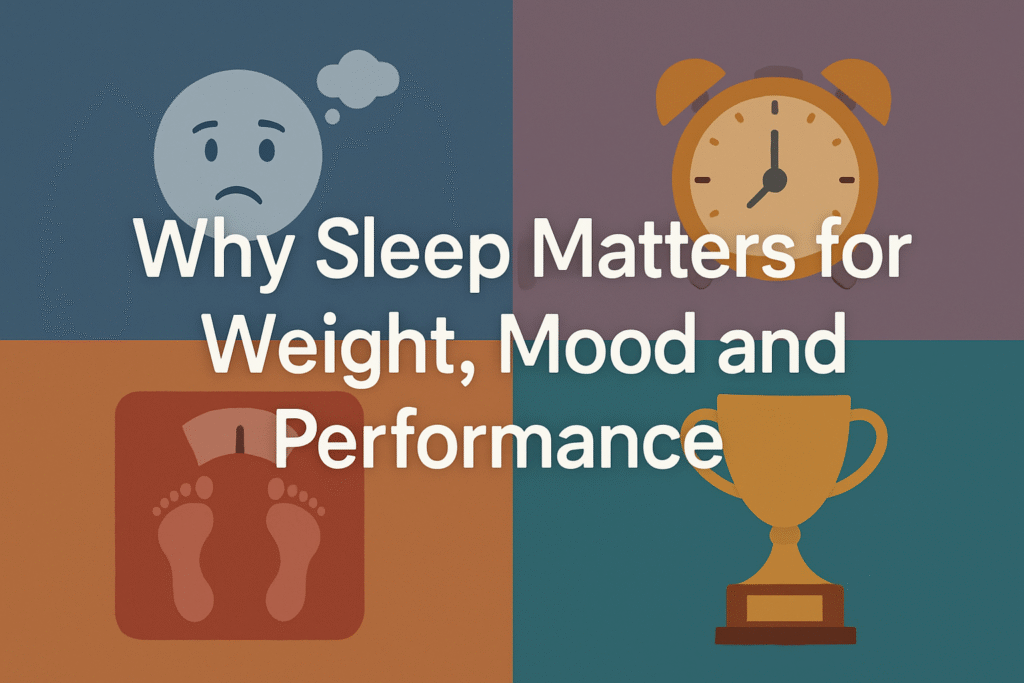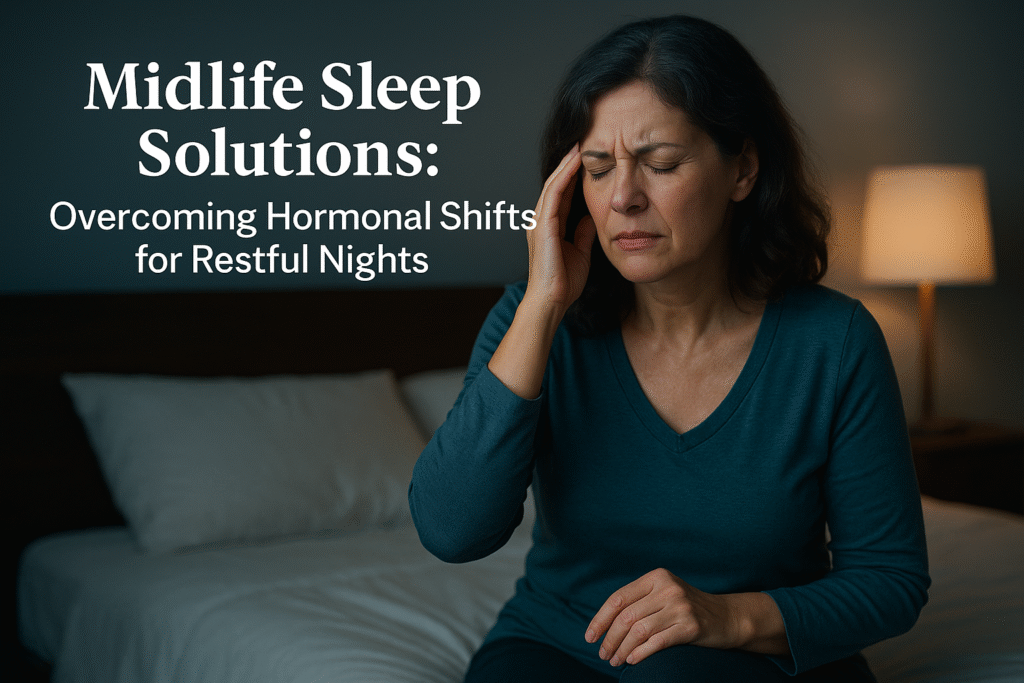Are you a high-achieving woman in your 40s or 50s who struggles with persistent fatigue, mood swings, and feeling ‘always on,’ despite your best efforts to stay healthy? You’re not alone. The unique combination of career obligations, family responsibilities, and hormonal shifts during perimenopause and menopause can significantly impact your sleep patterns. These changes can lead to difficulty falling asleep, frequent nighttime awakenings, and feeling drained despite trying everything to stay healthy. Understanding these hormonal shifts and their impact on sleep is the first step towards reclaiming restful nights and sustainable well-being.
How Hormones Affect Your Sleep After 40
Estrogen and progesterone
Your hormones play a crucial role in your sleep. Estrogen and progesterone help regulate your sleep cycles by supporting the production of calming hormones. During perimenopause and menopause, as these hormone levels fluctuate and decline, it can lead to difficulty falling asleep, more nighttime awakenings, and feeling restless. Additionally, stress can cause an increase in cortisol, making it harder to relax at night and contributing to those early morning wake-ups. Understanding how these hormonal shifts impact your sleep is essential for finding solutions. drbrighten.com
Cortisol and blood sugar
Cortisol, your body’s main stress hormone, naturally follows a daily rhythm, peaking in the morning and lowering at night. However, chronic stress, blood sugar imbalances, or inflammation can disrupt this rhythm. Elevated cortisol levels at night can make you feel wired when you’re trying to relax, leading to those frustrating wake-ups in the middle of the night. Additionally, declining estrogen levels can affect your blood sugar, and when it drops too low during the night, your body releases more cortisol, waking you up. Understanding these hormonal shifts and their impact on blood sugar is key to improving your sleep quality. drbrighten.com.
Vasomotor symptoms and “hormonal whiplash”
Perimenopause often brings disruptive symptoms like hot flashes, night sweats, and unpredictable hormone swings that can severely disrupt your sleep. Many women experience brain fog, unexplained awakenings in the middle of the night, and heightened emotional sensitivity. These aren’t personal flaws, but biologically driven symptoms. Fluctuations in estrogen and progesterone can make you more sensitive to cortisol, disrupt your sleep cycles, and make it harder to cope with daily demands. Understanding these hormonal effects can help you find strategies to improve your sleep quality.

Why Sleep Matters for Weight, Mood and Performance
Sleep isn’t just a luxury-it’s essential for your overall health. Getting quality sleep improves your decision-making, emotional regulation, and boosts your metabolism. When you don’t get enough sleep, it can increase your cravings for unhealthy foods, slow down your metabolism, and make it harder to lose weight, especially after 40 when hormonal changes already make fat loss challenging. Quality sleep also helps stabilize your blood sugar and cortisol levels, keeping your hunger and mood swings in check. Prioritizing sleep is crucial for managing your weight, boosting your mood, and improving your overall performance.
Building Better Sleep Hygiene
While hormone therapy or supplements can be helpful for some, making lifestyle changes is a powerful place to start. The National Institute on Aging recommends a consistent sleep schedule, avoiding late naps, and developing a relaxing bedtime ritual. Dr. Jolene Brighten, a naturopathic endocrinologist, emphasizes ‘hormone-friendly sleep habits’ that go beyond turning off your phone. Incorporating these strategies can significantly improve your sleep quality and overall well-being. nia.nih.gov.
Set up your sleep sanctuary
Creating a comfortable sleep environment is crucial for restful sleep. Keep your bedroom cool, dark, and quiet. Aim for a temperature between 65 and 68 degrees Fahrenheit, and use blackout curtains or an eye mask to minimize light. If hot flashes are an issue, a fan or cooling mattress pad can help you stay comfortable. It’s also important to limit screen time before bed, as blue light from electronic devices can interfere with melatonin production. Aim to power down at least an hour or two before bedtime and engage in relaxing activities like reading a book or journaling. Finally, ensure your mattress and pillows are comfortable and supportive, and choose breathable bedding to help you sleep better
Create a calming evening routine
Establishing a calming evening routine is crucial for preparing your body for sleep. Gentle movement, like light yoga or stretching, can help lower cortisol and promote relaxation. Incorporating practices like deep breathing or meditation can calm your mind, reducing stress and racing thoughts. Taking a warm bath or shower before bed can also help relax your body and prepare you for sleep. Consistency is key-going to bed and waking up at the same time each day, even on weekends, reinforces your natural sleep-wake cycle and improves overall sleep quality.
Morning habits that support nighttime rest
Starting your day with certain habits can significantly improve your sleep at night. Exposure to natural light in the morning helps regulate your body’s internal clock, signaling that it’s time to wake up and promoting better sleep later. Eating balanced meals with protein, healthy fats, and fiber helps keep your blood sugar steady, preventing disruptions during the night. Regular physical activity during the day can improve sleep quality, but it’s best to avoid vigorous workouts close to bedtime. Short movement breaks throughout the day can also help maintain your energy levels and promote better sleep
Manage stress and hormonal health
Managing stress and supporting hormonal balance are crucial for improving your sleep. Incorporating mindful practices into your day, like taking short breathwork breaks between tasks, can help lower cortisol and promote relaxation. Tracking your sleep along with your menstrual cycle and stress levels can help you identify patterns and make adjustments to your routine. If sleep difficulties persist, consulting with a healthcare provider is important to explore potential solutions like hormone testing or cognitive behavioral therapy for insomnia. Additionally, be aware of symptoms like snoring or waking up gasping, as these could indicate sleep apnea, which is more common during perimenopause and should be addressed by a healthcare professional.
Final Thoughts: Your Rest Is Worth Protecting
Addressing sleep issues in midlife is not a sign of weakness, but often related to hormonal shifts and the impact of modern stress. Wellness Next Step recognizes how exhaustion, weight gain, and mood swings can affect your professional and personal life. By prioritizing sleep hygiene, engaging in gentle movement, and practicing stress management, you can regain energy, improve focus, and support a healthier weight. Imagine waking up feeling refreshed, ready to tackle your day with clarity and confidence, while still having the energy to enjoy time with family and pursue hobbies.
Start with small, manageable changes, such as dimming the lights earlier, establishing a calming bedtime routine, or getting some morning sunlight. If you’re looking for personalized support that fits your busy schedule, reach out to us, Let’s chat! You can book a free strategy session with me today. You deserve restful sleep, balanced hormones, and vibrant health throughout your 40s and 50s.



